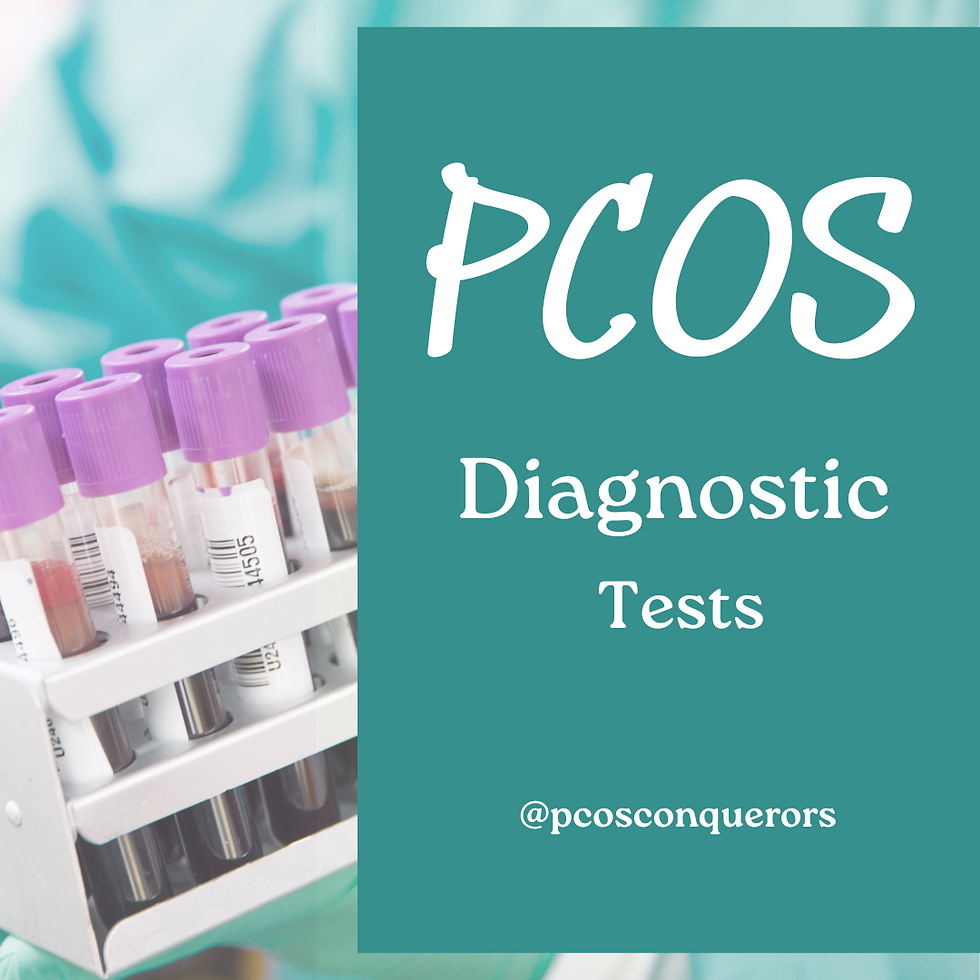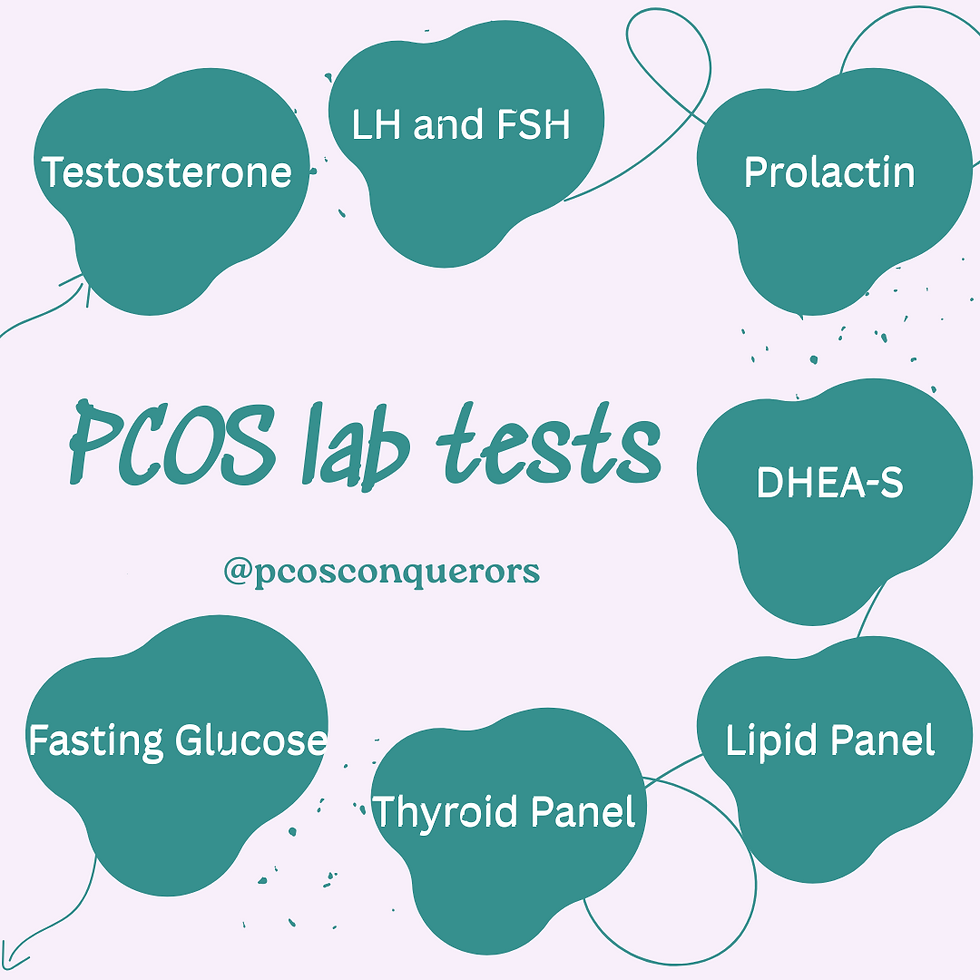Diagnostic Hormone tests for PCOS in Nigeria: What to know
- Olushola Ajani
- Jul 23, 2025
- 5 min read

If you've ever looked at your PCOS lab results and felt completely confused, you're in the right place.
For many Nigerian women living with PCOS, getting diagnosed is just the beginning.
The real struggle begins with decoding what it all means and knowing what to do next after a PCOS diagnosis.
In this article, we’ll break down common lab tests for PCOS, explain why your doctor might order them, what they mean, and how they relate to symptoms you might be experiencing.
Why lab tests matter for PCOS
The international PCOS guideline recommends starting with hormone and metabolic testing to give important insight into how your body is functioning.
These tests help check for hormone imbalances, insulin resistance, and other factors that can affect your overall health.
Understanding these results is a key step in confirming a PCOS diagnosis and figuring out the best way to manage it.
Common lab tests for PCOS in Nigeria and what they mean
1. Testosterone (Free and Total)
Women with PCOS often have high levels of androgens (“male” hormones) like testosterone.
This can cause symptoms like acne, facial hair (beard, moustache or chest hair), or thinning hair on the scalp.
Total testosterone is the overall amount in your blood while free testosterone is the part that’s active and can affect your body.
If your levels are high, it supports a PCOS diagnosis. But your doctor should also rule out other causes of high testosterone, like adrenal problems.
2. LH and FSH (Luteinizing Hormone and Follicle-Stimulating Hormone)
These two hormones help regulate your menstrual cycle and ovulation.
In many women with PCOS, LH is higher than FSH, which can stop ovulation (and cause irregular periods or infertility).
Doctors often check if the LH:FSH ratio is 2:1 or higher, this is common in PCOS, but not the only diagnostic clue.
3. Prolactin
High prolactin can stop periods or make it hard to get pregnant.
It also helps rule out other reasons for irregular cycles.
If your prolactin is high, your doctor may look into things like a benign (non-cancerous) growth in the pituitary gland.
A high result doesn’t always mean something serious, but it should be followed up.
4. DHEA-S (Dehydroepiandrosterone Sulfate)
This hormone is made by your adrenal glands and is another form of androgen.
If DHEA-S is high, it may mean your adrenal glands, not just your ovaries, are behind the androgen imbalance.
Knowing whether excess androgens are coming from your ovaries or adrenal glands helps your doctor guide your treatment.

5. Fasting Insulin, Glucose, and HbA1c
Insulin resistance is very common in PCOS and increases the risk of type 2 diabetes.
Fasting glucose and insulin tests show how your body handles sugar while HbA1c is your average blood sugar over the last 2–3 months.
Even if you feel fine, these tests help catch early warning signs.
If your levels are high, lifestyle changes and medication can help prevent diabetes.
6. Thyroid Panel (TSH, T3, T4)
Thyroid issues can look a lot like PCOS: irregular periods, weight gain, fatigue, and even fertility problems.
TSH shows how well your thyroid is being stimulated while T3 and T4 are the main hormones your thyroid produces.
Thyroid problems are common in women and need to be ruled out or treated alongside PCOS.
7. Estrogen and Progesterone
They’re important, but they’re not the main hormones used to diagnose PCOS.
If you're trying to conceive, they’re usually checked alongside other medical tests to evaluate fertility and plan fertility treatment options.
Because your estrogen (usually estradiol is tested) levels fluctuate during the menstrual cycle, testing at the wrong time can give misleading results.
Progesterone is low in most women with PCOS because they don’t ovulate regularly.
A “Day 21 progesterone test” is commonly used to confirm ovulation. If the level is low, it usually means ovulation didn’t occur.
So rather than diagnosing PCOS directly, low progesterone helps confirm one of the main symptoms of PCOS: irregular or absent ovulation.
8. Lipid Panel (Cholesterol test)
Women with PCOS are at a higher risk of heart problems, especially if insulin resistance is also present.
LDL (bad cholesterol), HDL (good cholesterol), triglycerides and total cholesterol levels are tested.
High cholesterol levels may lead to heart disease over time. Knowing your numbers early allows for better prevention.
9. Sex Hormone-Binding Globulin (SHBG)
SHBG is a protein made by the liver that binds to sex hormones like testosterone and estrogen in your blood.
When these hormones are bound to SHBG, they are inactive.
In PCOS, SHBG is often low, which means more free testosterone is available in your body.
This can lead to symptoms like acne, facial hair, or scalp hair thinning.
Low SHBG can also be a sign of insulin resistance, which is common in PCOS and can make symptoms worse.
Checking SHBG helps your doctor understand how much active testosterone is affecting your body, not just the total amount.
9. Ultrasound for PCOS diagnosis
This is an imaging test that shows structures inside your body using high-intensity sound waves.
It checks if your ovaries have the "polycystic" appearance (many small follicles).
The scan may reveal enlarged ovaries or a "string of pearls" pattern of follicles.
Not all women with PCOS have cysts, and having cysts doesn’t always mean you have PCOS.
Ultrasound is just one part of the diagnosis.
Optional but helpful tests for PCOS diagnosis
Vitamin D
Low in many women with PCOS. It may affect mood, insulin sensitivity, and immune health.
Vitamin B12 and Folate
Important if you’re taking metformin, which can lower B12 levels over time.
Talking to your doctor about your PCOS tests
Ask questions. It’s okay to say, “Please explain this result in simple terms.”
Don’t panic.
One test result isn’t the full picture.
Track your symptoms and results, your doctor will need to look at patterns over time.
Which tests come first?
Doctors usually start with tests that match your symptoms.
For example: If you have acne and missed periods, they may check testosterone and insulin first.
If you feel tired and are gaining weight quickly, a thyroid test may be done early on.
How often should I repeat these tests?
Hormones (Testosterone, LH/FSH, Prolactin): Every 6–12 months or when symptoms change.
Insulin, Glucose, HbA1c: Yearly or more often if you’re on meds.
Lipid Panel and Thyroid: Annually.
Ask your doctor what makes sense for you.
Knowledge Is Power
Your health journey is personal, knowing what’s going on in your body can reduce fear and help you take the right steps with your doctor.
Want help reading your lab results or finding a PCOS-friendly doctor in Nigeria?
Join the PCOS Conquerors WhatsApp support group for real-time help from other women who get it.
Disclaimer
This article is for informational purposes only and is not a substitute for professional medical advice, diagnosis, or treatment. Always consult with a qualified healthcare provider regarding any medical concerns, symptoms, or conditions, including Polycystic Ovary Syndrome (PCOS). The experiences shared here are meant to reflect common realities faced by Nigerian women with PCOS, but every woman’s journey is different. Do not ignore or delay seeking professional help based on something you’ve read here.
If you suspect you have PCOS or any other health condition, please speak to your doctor or a licensed healthcare professional.
References
Monash University. (2023). International Evidence-Based Guideline for the Assessment and Management of PCOS. https://www.monash.edu/medicine/mchri/pcos/guideline
Teede, H. et al. (2023). Recommendations from the 2023 International Evidence-Based Guideline for the Assessment and Management of Polycystic Ovary Syndrome. https://www.researchgate.net/publication/373137934
Abimbola Ottun, T. et al. (2021). Reproductive Endocrinologic Pattern in Infertile Black Women with Polycystic Ovarian Syndrome. Journal of Advances in Medicine and Medical Research, 33(22), 230–236. https://doi.org/10.9734/jammr/2021/v33i2231174







Comments